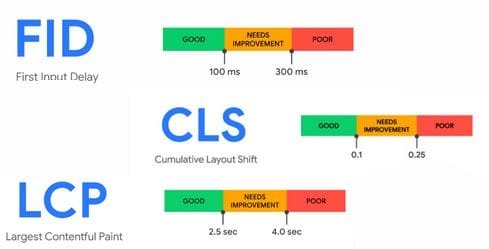Your ultimate guide to the new Google page experience SEO ranking factor

A brand new SEO ranking factor makes its way to our screens come 2021 – Google?s page experience. Google is incorporating page experience within its core ranking algorithm. They?ll be looking at things called ??Core Web Vitals?? as signals for page experience (we?ll touch on this throughout the article). In addition to this, they?ll also be leveraging current page experience signals so that they?re able to understand just exactly how good a webpage is. This ultimately all means that search engine optimization will be pushed a little further, and that if you don?t have a development team or any development experience, you won?t be able to take full advantage of this great new update.
With that being said, let’s dive right in.
H1: What Is Page Experience?

In order for us to understand just how important this new Google SEO ranking factor is, we first need to understand what page experience means. If you’re looking for a detailed explanation from the God’s at Google themselves, then you can click here to find a document that includes the full page experience criteria. Otherwise, check out this short description –
Google page experience metrics, in short, aim to understand how a user will perceive the experience of a specific webpage, they will take into consideration:
- Whether or not the page loads quickly
- If it’s mobile-friendly
- Does it run on HTTPS
- The presence of intrusive ads
- Does content jump around the page as it loads
You may think that this is completely new, but if you dig a little deeper, you’ll find that page experience is made up of several already existing Google SEO ranking factors, this includes:
- Page speed update
- Mobile-friendly update
- HTTPS ranking boost
- Intrusive interstitials penalty
- Safe browsing penalty
These all refine metrics around speed and usability. But, the refinements also fall under something we mentioned earlier, Core Web Vitals.
H2: What Are Core Web Vitals?
Core Web Vitals are user-centered metrics that give a score on different aspects of your page. They include interactivity, along with the stability of content as it loads. Core Web Vitals fall under the below metrics:
- Largest Contentful Paint (LCP): LCP measures loading performance. In order to provide a good user experience, LCP should occur within 2.5 seconds of when the page first starts loading. It’s a full measurement of how long it takes for the main content of a page to download, and be ready to interact with. The measurements include the largest image or block of the context within the user viewport along with videos, poster images, background images, and block-level text elements like paragraph tags. Anything that extends beyond the screen does not count.
- First Input Delay (FID): FID measures the time from when a user first interacts with your site. For instance, when they tap on a button, click a link, or use a custom JavaScript-powered control. It takes into account the time that the browser is actually able to respond to that interaction. The aim of a good user experience is that pages should have an FID of less than 100 milliseconds.
- Cumulative Layout Shift (CLS): CLS is there to measure visual stability. Once again, for a good user experience, pages should maintain a CLS of less than 0.1. This is a new metric that basically looks at if the page is stable when it loads, for example: do images, buttons, or content move around the page as it loads, or does it stay solid? In short, it’s the layout of the page shifting, resulting in a poor user experience.
When you group all of this together, you get this page experience name for all these elements. Google page experience specifically is not a ranking score, but rather, each element within has its own weights and rankings in the overall Google ranking algorithm.

H3: A Change to AMP
AMP (or, Accelerated Mobile Pages) will also be receiving a few changes.
Page experience metrics will be a factor an SEO ranking factor for top stories in search on mobiles, however, in order to typically rank in those top stories, you would’ve needed to of had an AMP requirement on mobile.
Whilst Google will still support AMP and will continue to link to AMP pages when available, once they roll out and implement the new system, it will no longer be a requirement for top stories. Google will now be removing the requirement so instead, you’ll now have to earn those positions. If you are currently leveraging AMP, you don’t have to stop. AMP is still an incredibly powerful technology, and it certainly does help your webpage move faster, it’s just no longer an obligation for top story eligibility.
The first thing we have to keep in mind is simply, don’t panic. When people see changes in Google, the first thing on their minds is to instantly rush and change everything on their website. However, you do have some time. In fact, a direct quote from Google states that they do recognize a lot of people may be responding to the pandemic right now, or they might be busy with a number of other things. Due to this, Google announced that the new and upcoming page experience will not happen until 2021, and we will all be provided with a 6-month notice in advance before the rollout.
H4: So, Now what?
Great content still stands as king. Google has made it clear that eye-capturing content filled with good information will still rank highly in Search, despite any poor page experience: ”While all of the components of page experience are important, we will rank pages with the best information overall, even if some aspects of page experience are subpar. A good page experience doesn’t override having great, relevant content. However, in cases where there are multiple pages that have similar content, page experience becomes much more important for visibility in Search,” Google wrote.
In terms of just how powerful this new rollout will be, well, we’ll find out soon enough. Google has created a new page experience signal by using a fantastic object-orientated approach, now comes the time to see whether it can be taken seriously by site owners, developers, and SEOs.







